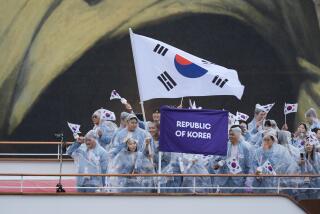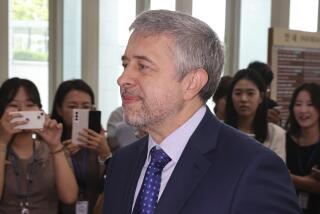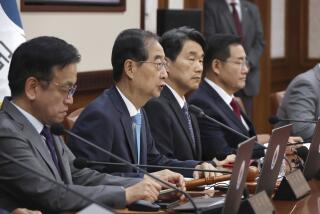North, South Korea Break Off Talks at End of Fiery Session
- Share via
SEOUL — Talks between North and South Korea, seeking to open a last-minute dialogue that might bring North Korean athletes to the Seoul Olympics, broke off Monday after parliamentary delegates pounded the table and shouted at each other.
Witnesses said the atmosphere of the 2 1/2-hour meeting in the border truce village of Panmunjom was markedly more acrimonious than in two previous sessions last Friday and Saturday.
Both sides refused to compromise on positions they staked out at the beginning of the talks, in which five-member delegations discussed how they might convene a large-scale parliamentarian conference in the North Korean capital of Pyongyang at the end of the month to resolve the Olympic question and hammer out a proposed nonaggression accord.
It now appears unlikely that the talks will resume anytime soon. A spokesman for the South Korean government said that, as of Monday evening, North Korea had failed to respond to Seoul’s request that they schedule a fourth preliminary meeting at Panmunjom to salvage negotiations.
“There is nothing we have agreed on,” Chon Kum Chol, head of the North Korean delegation, told reporters at the end of the session. He accused the south of failing to make any concessions Monday in its so-called revised proposal.
Seeks to Separate Issues
South Korean delegation chief Park Jun Kyu refused to budge from his demand that two separate meetings be convened in Pyongyang--one to negotiate an end to North Korea’s Olympic boycott and another to discuss the nonaggression accord.
But the north insisted that the two issues be dealt with in a single “mass participatory meeting” involving about 1,000 representatives, a forum that the south has dismissed as unworkable. The delegates from Pyongyang also held firm to their demand that North Korea be allowed to co-host the Games, which are scheduled to begin in Seoul on Sept. 17.
The south has rejected the idea of co-hosting and urged North Korea to agree to send athletes unconditionally.
“All I hope is that they come to the realization that South Korea is developing fast and getting more confident, so they can’t cheat using their old tactics,” Park said at a news conference.
At one point during the session, Park taunted his counterpart by proffering tickets to Moscow’s Bolshoi Ballet, which will make its first performance in Seoul in early September. The Soviet Union, along with China and nearly all of North Korea’s Communist allies, are scheduled to participate in the Olympics, leaving Pyongyang isolated in its hard-line boycott.
A member of the South Korean National Assembly, who belongs to the ruling Democratic Justice Party but did not participate in the talks, said the impasse in negotiations suggests the north is looking for an excuse to justify boycotting the Olympics.
‘Awkward Position’
“They’re in a very awkward position with Russia and China coming to Seoul,” said the lawmaker, who spoke on the condition he not be named. “They need some face-saving measures for international society and for the Korean people.”
Though apparently fruitless, the Panmunjom talks had represented a slight thaw in tense relations between the two Koreas, marking the first time in nearly three years that politicians from the two countries had agreed to meet.
Government-to-government negotiations aimed at working out an Olympic co-hosting arrangement broke down last year, with each side accusing the other of intransigence. The fear of Olympic terror has gripped Seoul organizers since the bombing of a South Korean airliner last November for which Pyongyang intelligence agents were held responsible.
A stumbling block in the current negotiations was the north’s attempt to link the Olympic question to the nonaggression accord.
Technically at War
The Seoul government originally proposed such a bilateral pact as an alternative to Pyongyang’s past demands for a formal peace treaty, which would include China and the United Nations command but would exclude South Korea because it was not a signatory to the armistice that ended the 1950-53 Korean War. The two Koreas have remained technically at war for the past 35 years.
Less than a month remains until the Seoul Olympics begin, and organizers have set Sept. 2 as the deadline for North Korean athletes to register for individual events. Team events are already closed.
More to Read
Sign up for Essential California
The most important California stories and recommendations in your inbox every morning.
You may occasionally receive promotional content from the Los Angeles Times.













